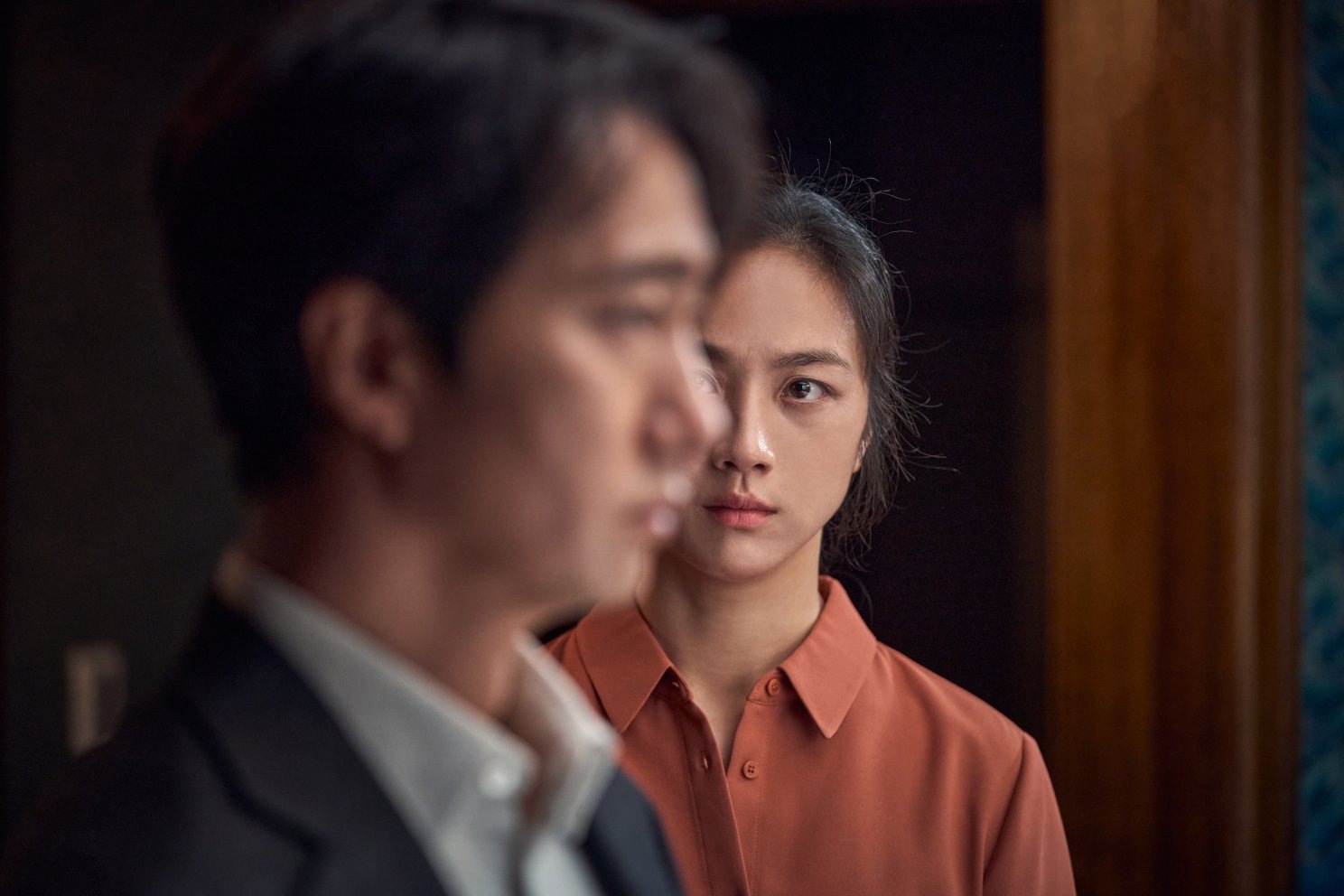“Congratulations… it’s a murder.” A backwards thing to celebrate? Not when you’re a droll insomniac detective who’s only happy (read: not miserable) when you’re investigating a killing, the likes of which have been absent lately. And especially not when that killing means an encounter with the lowkey crush exponentially consuming your thoughts. Alas, Park Chan-wook––eloquently maximalist writer-director behind Oldboy and The Handmaiden––is no stranger to bizarre characterization.
Police detective Hae-joon (Park Hae-il) has been married for a while, but as his tedious wife points out at the beginning, “55% of sexless marriages end in divorce.” If divorce isn’t necessarily on Hae-joon’s mind, that’s probably because he’s lazy—an ironic trait for someone whose job is a high-stakes game of paying attention to detail.
The latest assignment is a murder in Busan: a man pushed off a cliff right after he scaled a mountain, tumbling down in a comical trail of blood. (Park’s uncanny ability to portray the darkest realities in a humorous light is on full display here.) Right away Hae-joon suspects the victim’s wife, Seo-rae (Tang Wei), and foolishly lets her know. Just as immediately he falls in love (or something like it) with her, emotionally barring himself from doing a half-decent job. It’s only a matter of time before he’s investigating the murder of her next husband––which he vows not to lose to flirtatious entanglement this time around––in Ipo, a quiet, foggy, cliffside suburb that doesn’t get much murder traffic.
Decision to Leave isn’t the kind of movie that benefits from too much plot description. Not for fear of spoilers. If anything it’s a wolf in sheep’s clothing, giving plotless meandering mood films a run for their money in a new genre. It’s a movie that keeps you guessing until you realize you’ve over-guessed. It could make a frustrating experience for some, but take a thematic cue from the dense ocean mist that characterizes Ipo and the futility of guessing sinks in: answers are as plain as they seem.
Though there is a plot here, there are fewer tricks up its sleeve than one might expect from Park. The narratively explosive mind behind Thirst and The Handmaiden––in collaboration with regular co-writer Jeong Seo-kyeong––suggests twists to boot, but the real shock is that Decision to Leave doesn’t play like most Park films to date. There’s never a moment of grand revelation; rather a subtle, perpetual sense of understanding what’s going on, a fact that takes some pressure off the film and will likely make for a richer rewatch.
The typical police-procedural sleuthing is constant, and it’s integral to the slow-burn pace and shadowy, inscrutable tone. But this isn’t a murder mystery. There’s very little question about who and much more to wrestle with around the how and why, both of which point to a strange, sweet romance so unconventional it makes Phantom Thread’s look traditional.
She’s Chinese and he’s Korean, so they often use translator apps to communicate. As a non-speaker of their languages I can’t help but think some nuances of those exchanges are lost in translation. And Park certainly doesn’t hold your hand in that, but he doesn’t leave you behind either. His expertise in the instinctual language of cinema shines.
As always with Park, the camerawork is imaginative, fresh, and unexpected, coloring the film with another shade of emotion. Park shoots iPhones from the inside, cracking the code of how to present a phone onscreen that doesn’t look absolutely awful. As Hae-joon reads a message the camera shows his face through a milky filter beneath unintelligible curves of huge transparent letters that represent the text. He employs the same tactic in a shot through a dead man’s cloudy eyesight as ants crawl over the camera surface (i.e. the eyes) like giant insect monsters.
The camera is unstoppable, a bullet train of creative movement that pulls back and pushes in with the intensity of vertigo, twists 360 degrees, suddenly reverses and re-reverses its motion, turns upside down and back over again smoothly, and traverses mountains in startling camera choreography anyone would be hard-pressed to retrace. The heavily emphasized zoom work is jaunty and peculiar. Half of them, if not more, feel like they were executed in post to purposely lend an unsettling immediacy and off-kilter waviness to the motion of the zoom. First-time Park cinematographer Kim Ji-yong also relies on wide lenses to add an even greater sense of warpedness and distortion.
Even more impressive is the editing chockablock with imaginative transitions. At one point we’re looking at an X-ray of an arm that suddenly starts moving, the bones folding in as the hand stretches until—suddenly—you’re looking at a real arm outstretched in bed, waking up. On another occasion, lights flicker in a room and the transition glitches into daytime with a briefly flickering sun. It’s stylistically provocative and feels piecemeal but also quick, blink-and-you’ll-miss. Though you probably won’t.
That’s how a lot of Decision to Leave feels. There’s this underlying sense of having missed something, but it’s a simple story pregnant with tension, openly toxic romantics, and dazzling costumes. (If you’d told me a long, velvet red skirt went well with a fuzzy, light-pink sweater I’d have wrongly insisted otherwise.) But Park has also made a film unlike most other things, even his own, be that in its chain-link glove fist fight, soft shell turtle burglary, or courageously odd romance that gradually becomes a magnet. Go into this knowing it’s just a love story and don’t let the investigation of it all leave you fooled. Things are what they seem.
Decision to Leave premiered at Cannes Film Festival and will be released by MUBI.

